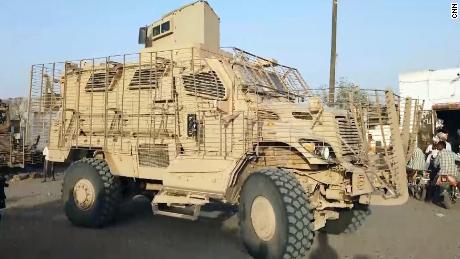On 25 March 2019, Senators Ben Cardin (D-MD) and Dick Durbin (D-lL) introduced a bi-partisan bill (S.854) that would halt US arm sales to countries that “engage in human rights abuses, commit war crimes, or have ties to extremist groups.” If passed, this bill would significantly impact the trajectory of the war in Yemen, a conflict replete with humanitarian abuses, by reducing US arms sales to Saudi Arabia, the United Arab Emirates, and other member states of the Arab coalition involved in the war.
Since the beginning of the war, constant warfare and air attacks have allowed Yemen to spiral into a humanitarian crisis, where disease and famine are commonplace. Cholera, brought on by a lack of available clean drinking water, has killed thousands. Simultaneously, a famine has claimed the lives of thousands more. Meanwhile, coalition air strikes and a naval blockade have sharply restricted aid shipments to the Yemeni people, further deepening these severe humanitarian crises. Despite documented human rights abuses on the part of coalition members, the United States continues to sell billions of dollars’ worth of military equipment to both Saudi Arabia and the United Arab Emirates (UAE).
Because the Saudi-led coalition dominates Yemen’s airspace, Saudi forces are able to launch airstrikes with relative impunity. These airstrikes inflict major civilian casualties, and the Saudis have recently come under extensive international criticism as a result. In addition to killing or maiming civilians, these strikes also damage or destroy refugee camps, cultural sights, and critical infrastructure such as hospitals, homes, schools, or roads. On 23 March 2019, a Saudi airstrike destroyed a Yemeni hospital, killing seven and further deepening the humanitarian crisis and Yemen’s ability cope with preventable diseases. Other similar attacks against medical facilities have led major human rights groups such as Doctors without Borders (MSF) to pull out of certain provinces, citing security and safety risks following strikes against their facilities. Another Saudi strike, on 9 August 2018, targeted a Yemeni school bus, killing 40 children and wounding a further 56. Significantly, this strike used a 500lb bomb manufactured by American defense contractor Lockheed Martin. The United Nations High Commission on Refugees stated that each week 123 civilians are killed each week by Coalition strikes and Houthi rebels–33% of which are women and children. At the time of writing, the United States continues to supply the Saudis, even though the Saudis have made no discernable attempt to improve their pilots’ training, widely distribute a no-strike list, or minimize civilian casualties.
The Saudis are not America’s only buyers. Since 2014, the United States has approved several multi-billion dollar arms sales to the UAE, and continues to supply it with everything from guided missiles and jets to artillery and armored vehicles. Both Amnesty International and CNN claim that the UAE is “recklessly” arming on-the-ground militia fighters in Yemen. Amnesty further claims that the UAE routinely supplies western weapons directly to Yemeni militias “known to be committing war crimes.” Amnesty and the United Nations Human Rights Council have also detailed how these militias frequently physically and sexually torture inmates. The presence of US weapons in the hands of these UAE-backed militias has been further confirmed by photographic evidence gathered by both Amnesty and CNN. The photos, which depict Yemeni militia men operating mine resistant ambush protected vehicles (MRAPs), were likely obtained as part of a shipment of these vehicles originally purchased by the UAE in 2014. Crucially, these weapons often fall into the hands of terrorists, providing groups like Al-Qaeda with a direct source of expensive western weaponry they could not obtain elsewhere.
Cardin’s attempt to halt such shipments is significant, but it is not the first attempt to restrict US arms sales to Saudi Arabia, nor to link such sales to human rights reform. In 2008, President Bush signed the “Child Soldiers Prevention Act” which bars the United States from selling arms to countries with child soldiers, but also allows the president to waive these laws if it is deemed within the national interest. More common are executive actions designed to stop individual sales, rather than comprehensive legislation. In December 2016, President Obama blocked the sale of 16,000 American-made rockets to Saudi Arabia, citing concerns over “civilian casualties.” In addition to Senator Cardin’s bill, a bipartisan majority in the Senate voted on 13 March to end US support for the war in Yemen. This law comes on the heels of an earlier bipartisan War Powers Resolution vote in the House that passed in mid-February. While neither of these resolutions were veto proof, and died shortly after they were voted on, if passed, Cardin’s bill, S.854, would take a new approach: explicitly connecting the issue to human rights and weapons sales, rather than to Congress’ constitutional power. The Senator’s bill would allow the United States to join other countries that have reduced arms sales to members of the Saudi and Emirati led coalition. As of now, Finland, Norway, Denmark, Greece and Germany have all announced a blanket ban on Saudi arms sales.
At this moment, American weapons are being used by Saudi- and Emirati- controlled forces to kill and maim Yemeni civilians, including children. The continued sale of weapons to these countries will not only worsen the human rights abuses ongoing in Yemen, but could potentially become a national security threat, should these weapons be obtained by terrorist groups. A bill that would halt such sales until the United States can obtain a demonstrable commitment to Human Rights from members of the GCC coalition would not only benefit the people of Yemen, but also the United States.
Casey O’Hara is an Advocacy Intern at ADHRB





